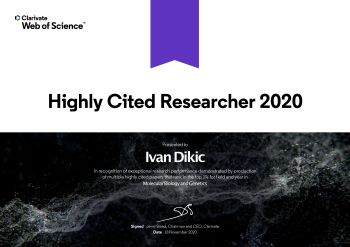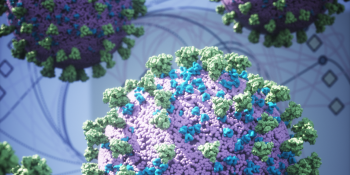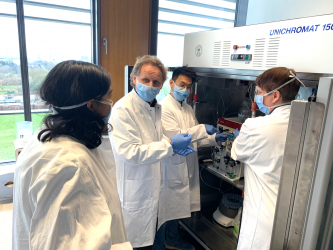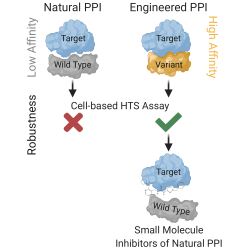News from the Institute

For the third year in a row, IBC2 Director Ivan Đikić is recognized as one of the pioneers in his field on Clarivate’s Highly Cited Researchers list. His papers rank in the top 1% by citations in the field of “Molecular Biology & Genetics”. In previous years, he was honored for his exceptional performance in the “Molecular Biology & Genetics” and the “Cross-Field” sections.
... (read more)
Christian Münch, group leader at the Institute of Biochemistry II of Goethe University Frankfurt, won the Binder Innovation Prize 2020 awarded by German Society for Cell Biology. It recognizes his groundbreaking work on translation control by stress responses for which he developed novel methodology and that also provided new insight into the biology of SARS-CoV-2.
... (read more)
New therapeutic targets preventing SARS-CoV-2 replication.
Researchers around IBC2 Group Leader Christian Münch comprehensively analyzed the response of human host cells to SARS-CoV-2 infection and identified growth factor receptor (GFR) signaling as essential for SARS-CoV-2 replication. GFR signaling plays important roles in various diseases. Five different drugs targeting GFR signaling prevented production of SARS-CoV-2 particles in cells. These results are now published in Molecular Cell.

Molecular differences between SARS and SARS-CoV-2
Scientists from IBC2 and collaborating teams identified the papain-like protease (PLpro) of SARS-CoV-2 as an essential viral enzyme and potential weak spot. PLpro is required for the processing of viral polypeptides and the assembly of new viral particles within human cells. In addition, SARS-CoV-2 uses this enzyme to dampen the anti-viral immune response, helping the virus to modulate the host’s immune system to its own benefit. By this, the virus can easily multiply and spread further. The team has demonstrated that pharmaceutical targeting of PLpro by a non-covalent inhibitor (GRL-0617) blocks virus spread and increases anti-viral immunity in human epithelial cells, the prime site of pathogen entry. The respective results are now published in Nature.
... (read more)
Weak binding affinity between two interacting proteins is very beneficial for cellular signaling cascades, ensuring their dynamic ON/OFF regulation. However, weak affinity of protein-protein interactions (PPIs) also represents a major obstacle in chemical screening. The root of the problem is a lack of approaches for targeting such interactions, ultimately limiting our abilities to discover novel medicines. In an article published in Cell Chemical Biology, Maculins et al., 2020 describe an innovative approach to chemical screening.
... (read more)